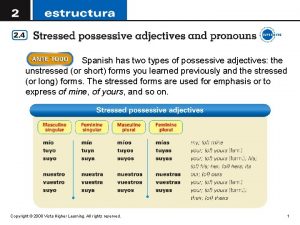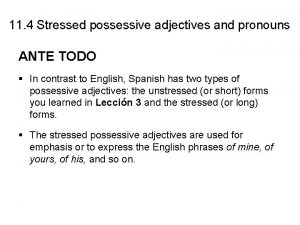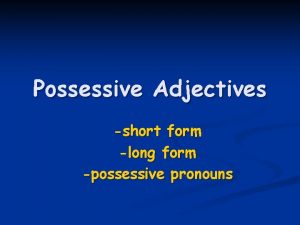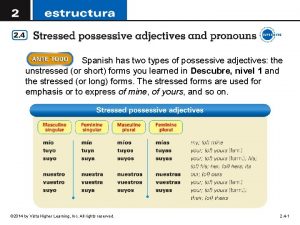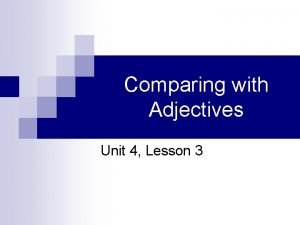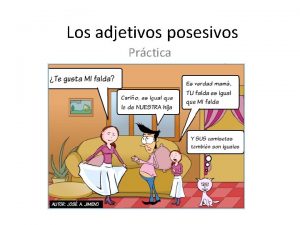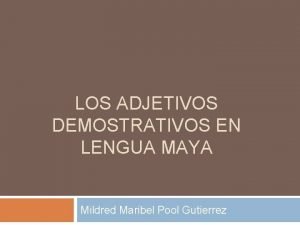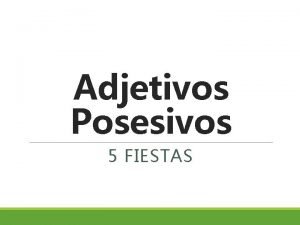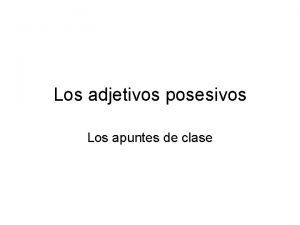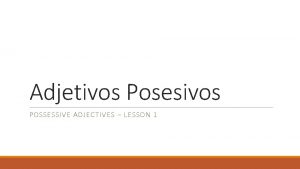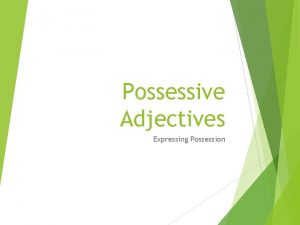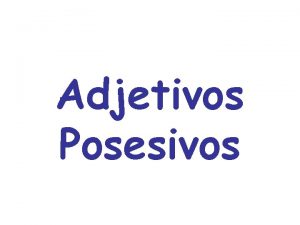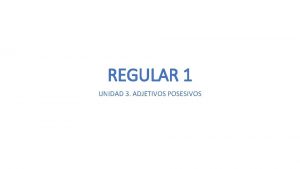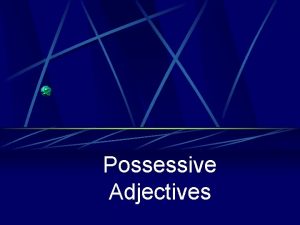Adjetivos Posesivos Possessive Adjectives Showing Possession In Spanish
















- Slides: 16

Adjetivos Posesivos Possessive Adjectives

Showing Possession In Spanish there are NO apostrophes. You cannot say, for example, Jorge’s dog, (using an apostrophe)

Showing Posession You must say, “The dog of Jorge, ” only in Spanish. Like this: El perro de Jorge.

De + noun This concept of showing possession is using “de + noun. ” For example:

De + Noun Tengo el cuaderno de Felipe. La hermana de Maria es amable.

Possessive Adjectives DESCRIBE nouns, correct? Well, they can also show possession.

Possessive Adjectives Here are the possessive adjectives in English: my, your, his, her, our, and their.

Posessive Adjectives It like saying “my dog, your house, his notebook, etc. ”

Here are the possessive adjectives in Spanish!

Posessive Adjectives singular mi / mis (my) plural nuestro a, os, as (our) vuestro, a, os, as tu / tus (your) su / sus (his, her) su / sus (their) or (your f. )

Possessive Adjectives Some examples: mi hermano My brother tu abuela Your grandmother su hijo Your son nuestro tío our uncle nuestra tía Our aunt mis hermanos My brothers & Sisters tus abuelas Your grandmothers sus hijos Her sons nuestros tíos Our uncles nuestras tías Our aunts

Possessive Adjectives The possessive adjective must be singular if the noun is singular and plural if the noun is plural.

Posessive Adjectives Mi prima es alta. Todas mis primas son altas.

Posessive Adjectives ¿Son rubios los hermanos de Rafael? No, sus hermanos son pelirrojos.

Posessive Adjectives Since su and sus have many meanings, use the prepositional phrase de + name/pronoun instead for clarity or emphasis.

Posessive Adjectives Sus pantalones son elegantes. ¿Los pantalones de ella? No, los de usted.
 Posessive adjectives
Posessive adjectives Apostrophe before or after s
Apostrophe before or after s Unstressed possessive adjectives in spanish
Unstressed possessive adjectives in spanish Indica las formas tonicas de estos adjetivos
Indica las formas tonicas de estos adjetivos 2.4 stressed possessive adjectives and pronouns
2.4 stressed possessive adjectives and pronouns Pronouns short form
Pronouns short form Spanish possessive adjectives
Spanish possessive adjectives Posessive its
Posessive its Possessive adjectives spanish long form
Possessive adjectives spanish long form Unstressed possessive adjectives spanish
Unstressed possessive adjectives spanish Mi televisor adjetivo 1 of 2 pronombre
Mi televisor adjetivo 1 of 2 pronombre Unit 1 lesson 3 los adjetivos posesivos
Unit 1 lesson 3 los adjetivos posesivos Tu es un adjetivo
Tu es un adjetivo Pronombres en maya y español
Pronombres en maya y español Cuales son los adjetivos posesivos
Cuales son los adjetivos posesivos Adjetivos posesivos
Adjetivos posesivos Encierra los adjetivos posesivos
Encierra los adjetivos posesivos



